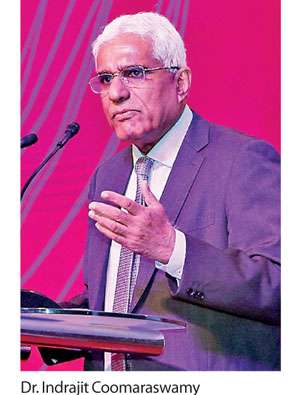06 Dec 2018 - {{hitsCtrl.values.hits}}
By Nishel Fernando
The political leaders representing the major political parties in the country are in agreement to get the International Monetary Fund (IMF) programme back on track as soon as possible to stabilise the economy, amid external financial conditions increasingly becoming unfavourable for the island nation, according to Central Bank Governor Dr. Indrajit Coomaraswamy.

“Right across the political spectrum, there is a commitment to the macroeconomic framework, which we have to stick to, given our debt and deficit dynamics as there’s a little room to manoeuvre. That massage has been seemed to absorb by whole of the political spectrum.
Across the political spectrum, there’s a consensus to stick to overall budget deficit targets of 5.3 percent GDP this year and primary balance surplus of 0.7 percent.
Not only there’s a commitment to the macroeconomic framework but also right across the political spectrum, there’s a recognition that we need to get the IMF programme back on track as soon as possible,” he said.
Dr. Coomaraswamy made these remarks delivering the keynote speech at the 54th Annual Report Awards organised by the Institute of Chartered Accountants of Sri Lanka, Tuesday evening, in Colombo.
The IMF has put on hold the final phase of the three-year loan programme with the country plunging into political crisis when President Maithripala Sirisena appointed former president Mahinda Rajapaksa as prime minister sacking Ranil Wickramasinghe on October 26.
However, the Central Bank had said that earlier on the same day (October 26), the IMF had reached a staff-level agreement in principle on the fifth review of the Extended Fund Facility, which was to be announced in the following week.
Following the political crisis, the three major credit rating agencies— Moody’s, Fitch and S&P— have downgraded Sri Lanka’s sovereign rating.
However, Dr. Coomaraswamy called the rating downgrades “hasty, superficial and unwarranted”, while noting that even the IMF had advised Moody’s to wait until the Supreme Court verdict on the dissolution of Parliament.
“In our view, the rating agencies have been influenced too much by the headlines in the media, which tend to sensationalise things rather than look at the underlying fundamentals,” he said.
Dr. Coomaraswamy lamented that the rating downgrades further add to Sri Lanka’s woes as already the heightened political uncertainty in the country caused the future borrowings of the country to be more expensive.
“It has got tougher; it’s going to be more expensive to borrow as we have been downgraded by all three agencies due to political instability.
So the tenure is going to be less, cost is going to be more but for the moment, anyways we have sufficient access to financing. We are still confident that we would be able to raise money to meet our obligations,” he said.
The governor emphasised that the Central Bank and Finance Ministry can raise up to US $ 1.7 billion (Rs.310 billion) to meet the debt obligations next year, even without the approvals of the Cabinet, as the relevant resolution under the Active Liability Management was passed in Parliament in October.
Though the adverse impact from the current political turmoil is manageable for the moment, Dr. Coomaraswamy stressed that it must be solved as soon as possible.
“There’s no doubt the political uncertainly in the country has been a major destruction and it will have short and long-term adverse consequences. It’s imperative that the political stability is restored as soon as possible. It has to be done,” he said.
However, Dr. Coomaraswamy highlighted that there are several positive takeaways from the current crisis.
“There have been certain positives one can take away. I know I’m beginning to sound like one of those losing captains at a post-match interview,” he quipped.
He noted that despite the crisis, the most state intuitions, including the Central Bank, are carrying out their businesses as usual, while there had been no violent activities, despite the massive protests and unlike in other countries, the military didn’t take advantage of the situation to carry out a military coup.
“We had thousands of people protesting out on the streets but there has not been any violence so far. It’s a sign of the maturity of our democracy.”
If you have a political vacuum of this sort, in many countries, you would have had a military coup. But in Sri Lanka, it doesn’t even enter our minds. We have a highly trained and efficient military but they find their balance ready defend the country and not to use the political power,” he pointed out.
Speaking of currency depreciation, Dr. Coomaraswamy was optimistic that the downward pressure on rupee would be eased as both domestic and exogenous conditions are stabilising.
He said that expanding the current account deficit is stabilising as the key imports: vehicle and gold imports have stabilised while the oil prices have come down to the US $ 60 range, from US $ 80.
“With oil prices coming down, with a greater use of hydro, hopefully, the oil imports would be somewhat contained. There should be less pressure on the currency, going forward,” he said.
In terms of exogenous factors, the governor said that the United States Federal Reserve has indicated that the normalisation or increase of US interest may not be quite aggressive as earlier considered.
“In fact, the 10-year US treasury yield went below 3 percent for the first time about in a year,” he said.
He was hopeful these developments would contain the foreign exchange outflows from Sri Lanka, easing pressure on the rupee.
16 Nov 2024 11 minute ago
16 Nov 2024 2 hours ago
16 Nov 2024 5 hours ago
16 Nov 2024 5 hours ago
16 Nov 2024 6 hours ago